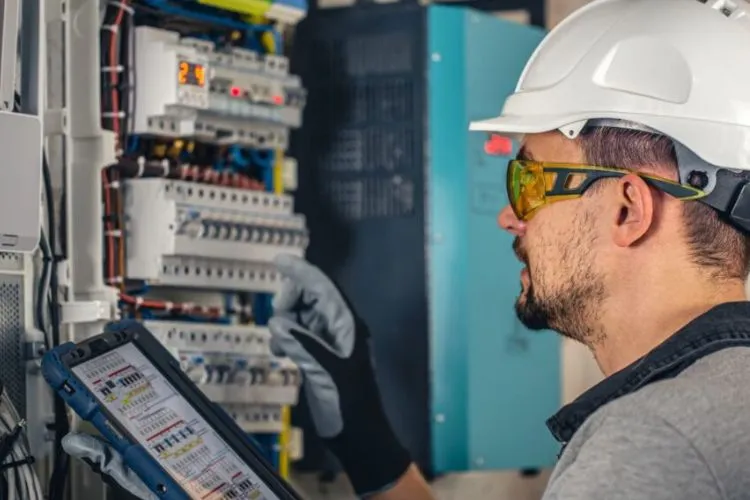When the power goes out, the silence that follows is a stark reminder of our reliance on electricity.
Whether for a large data center, a medical facility, or simply to keep the lights on at home during a storm, having a reliable backup power source is essential.
When comparing diesel generators vs UPS systems, each has its own strengths and weaknesses, making the choice between them crucial depending on your needs.

Diesel Generators Vs UPS Systems
Diesel generators harness the energy from diesel fuel to generate electrical power. They are known for their robustness and can supply electricity for extended periods, making them ideal for prolonged outages.
However, they do have drawbacks, including noise, emissions, and the need for a steady supply of fuel. On the other hand, UPS systems provide instant power backup by drawing energy from batteries or flywheels.
They’re silent and clean, ideal for indoor environments or places with strict emission controls. However, they typically offer power for a shorter duration, suitable for bridging short outages until a more permanent solution, like a generator, kicks in.
Power Capacity and Scalability
Diesel generators come in a wide range of sizes, from small portable units to large industrial-scale generators.
This versatility makes them adaptable to varying power needs, from powering a single home to an entire building. Moreover, adding more generators in parallel can increase power output, offering scalability.
UPS systems, while also available in various sizes, possess a predefined capacity limit based on their design.
Expanding a UPS system to accommodate growing power requirements often means adding more units, which can be less efficient and more costly than scaling up with generators.
Runtime and Fuel Efficiency
The runtime of diesel generators is primarily limited by the fuel supply. With adequate fuel, they can operate for days or even weeks, making them indispensable in situations where power outages are prolonged.
UPS systems, in contrast, depend on the stored energy in batteries or flywheels. Once this energy depletes, the system cannot provide power until the main power source returns.
For most models, this means a runtime ranging from a few minutes to a few hours.
Maintenance and Reliability
Maintenance is a critical aspect of diesel generators. Regular checks and servicing are necessary to ensure they operate efficiently and reliably.
Ignoring maintenance can lead to reduced fuel efficiency and potential failures. UPS systems are generally less maintenance-intensive and more reliable in the short term.
Batteries do degrade over time and require replacement, but with proper maintenance, a UPS can provide a reliable source of backup power with minimal intervention.
You may also find useful: How Long Do Diesel Generators Last | Portable vs Standby Generators
Environmental Impact
The environmental impact of power backup solutions like diesel generators and UPS systems is a significant consideration.
Diesel generators, while reliable for long-term power outages, contribute to air pollution through the emission of particulates, nitrogen oxides, and carbon dioxide. These emissions not only pose health risks but also contribute to climate change.
On the other hand, UPS systems offer a cleaner alternative for immediate power backup. However, the environmental footprint of UPS systems lies in the lifecycle of their batteries.
The manufacturing and disposal of batteries, especially lead-acid and lithium-ion types, raise concerns about resource usage and hazardous waste.
Proper recycling and disposal practices for UPS batteries are crucial to minimize their environmental impact.
Both systems thus present unique challenges and underline the importance of pursuing advancements in eco-friendly technologies and sustainable power solutions to lessen their environmental impact.
Initial Investment and Operating Costs
The financial implications of choosing between diesel generators and UPS systems are crucial for users. Initially, diesel generators often incur a higher purchase cost, especially for large-scale models designed for extended power outages.
However, the long-term operating expenses can also be substantial due to fuel consumption and regular maintenance requirements, including oil changes, fuel filter replacements, and general servicing to ensure efficiency and reliability.

Conversely, UPS systems typically demand a lower initial investment, especially for capacities designed to cover short-term outages.
Their operating costs tend to be lower as well, as they primarily rely on electricity to recharge and do not consume fuel during operation.
Nevertheless, the replacement of batteries, which can be necessary every 3 to 5 years depending on the model and usage, does add to the total cost of ownership.
Understanding these financial aspects can help users make an informed decision that balances initial outlay with the long-term operational costs associated with each backup power option.
Frequently Asked Questions (FAQs)
What is the main difference between diesel generators and UPS systems?
The main difference lies in their power source and runtime. Diesel generators use fuel to generate electricity for an extended period, while UPS systems provide immediate but short-term power from stored energy.
Can UPS systems be a residential power backup solution?
Yes, UPS systems can serve as an effective power backup for homes, especially for keeping critical devices running during short power outages.
How do diesel generators and UPS systems complement each other?
In many settings, integrating both systems offers the best solution. The UPS can provide immediate power during short interruptions, allowing time for the diesel generator to start and stabilize for longer outages.
Which offers longer backup power: diesel generators or UPS systems?
Diesel generators can offer longer backup power, limited only by fuel supply, making them suitable for prolonged outages.
Evaluating the long-term costs: diesel generators or UPS systems?
Diesel generators may have higher fuel and maintenance costs, but they last longer. UPS systems have lower operating costs but may require battery replacements and have a shorter overall lifespan.
Integrating Diesel Generators and UPS Systems
In many applications, especially for large businesses, critical facilities, or industrial operations, using both a diesel generator and a UPS system together provides a highly effective power solution.
The UPS system can immediately supply power in case of a brief interruption, ensuring that there is no downtime for sensitive equipment such as servers, medical devices, or communication systems.
This allows the diesel generator to kick in and take over once the UPS’s battery supply is depleted, ensuring a seamless transition to long-term power during extended outages.
This combined approach provides the best of both worlds—instantaneous backup power when needed and robust, long-term power once the generator is activated.
This setup is commonly used in data centers, hospitals, and factories where even short power interruptions can result in significant losses or safety risks.
By integrating both systems, these critical operations can maintain uptime without worrying about the limitations of either technology.
Industry-Specific Considerations
The choice between diesel generators and UPS systems may also depend on the industry or application. For instance, hospitals and healthcare facilities prioritize uninterrupted power to maintain the operation of life-saving equipment.
In this case, a UPS system is essential for instant backup, ensuring that medical devices like ventilators, monitoring systems, and emergency lighting continue to operate during a power loss.
On the other hand, industries that rely on high-power equipment, such as manufacturing plants or large-scale construction sites, may favor diesel generators for their ability to handle high loads over extended periods.
These sectors require power solutions that can support machinery and ensure minimal disruption during long outages.
Technological Advancements in Diesel and UPS Systems
Both diesel generators and UPS systems have seen significant technological advancements in recent years.
Diesel generators now feature cleaner emissions, quieter operations, and improved fuel efficiency, making them more environmentally friendly and user-friendly.
Likewise, UPS systems have become more efficient, with newer models offering longer runtimes, faster recharging capabilities, and smarter battery management systems that extend the life of the batteries.
Conclusion:
The choice between diesel generators and UPS systems hinges on your specific power backup needs. Diesel generators offer robust, long-term solutions for extensive power outages but come with higher operational demands.
UPS systems shine in providing immediate, albeit short-term, power supply with minimal maintenance, making them ideal for bridging brief interruptions until a more permanent solution takes over.
Understanding the strengths and limitations of each option allows for an informed decision, ensuring you have the reliable power backup when you need it most.
